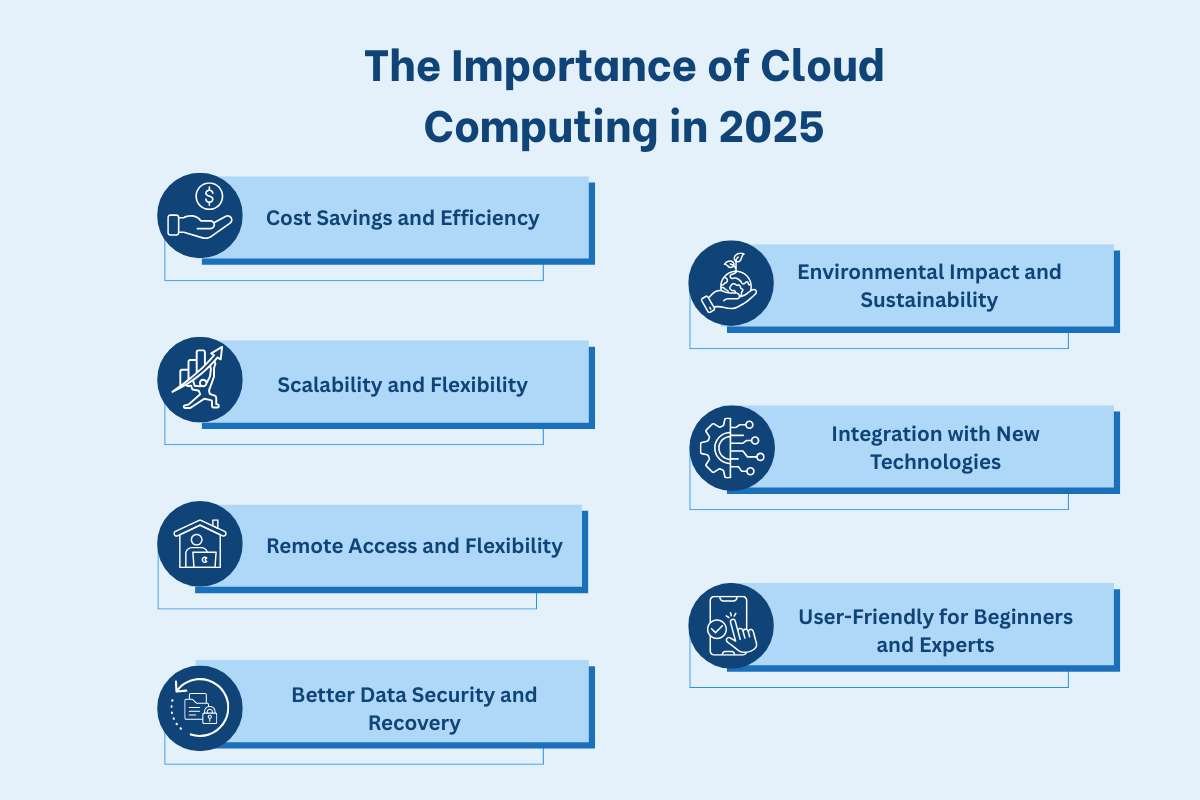Businesses today are highly reliant on digital tools. Over the past few years, technological advancements have led organizations to adopt cloud computing across multiple fields. Storing in the cloud has become the safest means to protect sensitive data. Cloud computing has changed how companies access and manage data, driving them to work more efficiently. Whether it is an MNC, a startup, or a government agency, the reliance on cloud services is ubiquitous. Cloud computing’s ability to deliver convenient remote access to data and applications and its cost-effectiveness and scalability make it a vital resource.
In the next few years, companies won’t rely on servers anymore. Hardware won’t be an obstacle for developers when designing apps. Let’s briefly discuss the importance of cloud computing by understanding its key benefits and how future technological advancements will build upon these foundations.
What Is Cloud Computing?
Cloud computing is the on-demand delivery of various computing services such as storage, servers, databases, networking, software, analytics, and intelligence over the internet. It allows users to access technology resources without owning or managing physical infrastructure.
Cloud computing allows individuals and businesses to avoid the cost and complexity of buying hardware, setting up servers, and maintaining data centers. It automatically adjusts resources, whether storage, computing power, or bandwidth, to deliver what is needed. These services operate through a global network of secure data centers routinely updated with the latest hardware and software. This results in faster performance and reduced network delays.
Cloud computing also strengthens data protection with built-in security features, including strict access controls, encryption, and regular monitoring, making it a reliable solution for personal and business use.
There are three main models of cloud computing:
- Infrastructure as a Service (IaaS): Offers basic computing resources like virtual machines, networking, and storage. Users can manage operating systems and applications while the provider handles the infrastructure.
- Platform as a Service (PaaS): A ready-to-use platform where developers can build, run, and manage applications without managing the underlying infrastructure.
- Software as a Service (SaaS): Delivers software applications over the internet, usually through a web browser, with everything managed by the provider, from servers to storage.
The Importance of Cloud Computing in 2025

1. Cost Savings and Efficiency
One of the main reasons companies use cloud computing is cost control. Instead of spending on expensive hardware and software, companies pay only for what they use. This model helps businesses, especially startups and small enterprises, manage their budgets better.
It reduces the need for large IT teams and cuts maintenance costs. Updates happen automatically, and systems run more smoothly. In short, businesses save money and can focus more on their goals than on their infrastructure.
2. Scalability and Flexibility
Another key importance of cloud computing lies in its flexibility to scale up or down based on demand. With cloud computing, you can scale up or down based on your needs. For example, an e-commerce company may experience higher traffic during festive sales. Instead of buying extra servers for just a few days, cloud platforms allow them to increase capacity instantly and reduce it later.
This flexibility makes it ideal for growing companies or those that face seasonal demands. Even personal users benefit from this; they can add or remove storage easily without hurdles.
3. Remote Access and Flexibility
The growing importance of cloud computing is evident in how it supports remote work and online operations. Employees can access files, attend meetings, and collaborate on projects from anywhere worldwide.
This convenience supports better work-life balance, reduces commuting, and increases job opportunities globally. Schools, too, rely on cloud-based platforms for online learning and assignments.
4. Better Data Security and Recovery
A primary importance of cloud computing is its approach to data protection. Cloud platforms invest heavily in security. They use encryption, regular monitoring, backups, and advanced systems to protect data. If one server fails, your data is safe because it’s backed up in multiple locations.
Cloud-based backups allow businesses to recover quickly in emergencies like system crashes, natural disasters, or cyberattacks. They reduce downtime and help avoid financial losses.
5. Environmental Impact and Sustainability

The importance of cloud computing extends to its positive environmental impact. Using cloud computing can help companies lower their carbon footprint. Shared cloud data centers are more energy-efficient than running individual servers. Many cloud providers also use renewable energy to power their operations.
Cloud technology also indirectly supports environmental sustainability by reducing the need for physical hardware and travel (thanks to remote access).
6. Integration with New Technologies
Cloud platforms work with AI, machine learning, and IoT (Internet of Things). Businesses can automate processes, generate real-time insights, and make faster decisions.
From healthcare and finance to agriculture and manufacturing, cloud computing enables better services and more intelligent systems across industries.
7. User-Friendly for Beginners and Experts
Lastly, the importance of cloud computing lies in its accessibility for all skill levels. For beginners, cloud computing removes the need to deal with technical setups. Platforms like Google Cloud and AWS offer simple dashboards and guides. You can get started without any hardware knowledge.
For advanced users, the cloud offers endless possibilities for building machine learning models, creating complex applications, or even running simulations. For professionals, you can deeply customize cloud environments.
Limitations of Cloud Computing

- Internet Dependency: Cloud services need a stable internet connection. Poor connectivity can disrupt access to data and tools.
- Data Privacy Concerns: Since data is stored off-site, some industries worry about control, compliance, and unauthorized access.
- Limited Customization: Cloud platforms often offer standard setups that may not suit unique or legacy business needs.
- Vendor Lock-In: Moving from one cloud provider to another isn’t always easy and can lead to compatibility or cost issues.
- Security Risks: Misconfigurations or weak user practices can expose data despite built-in protections from providers.
The Future of Cloud Computing
In the coming years, the importance of cloud computing will continue to grow exponentially. Edge computing, for instance, will reduce delays by processing data closer to its point of creation. Concurrently, hybrid cloud models (a mix of public and private cloud) will offer organizations unparalleled control and flexibility.
Cloud services are becoming even more essential across diverse industries. In healthcare, they ensure patient data is accessed quickly and securely, while in banking, they provide the high computing power needed for real-time transactions and fraud detection. Furthermore, many governments and educational institutions invest in cloud systems to deliver smoother citizen services and advance digital learning.
Conclusion
As we move further into a digitally driven world, the importance of cloud computing continues to grow. It has become more than just a convenient storage option; it’s now influencing how modern businesses operate. The cloud has opened up opportunities across all industries, from cutting costs and improving flexibility to enabling remote work and supporting emerging technologies.
Despite a few limitations, cloud computing remains one of the most dependable and future-ready technologies available today. The cloud has become essential for startups looking to grow, enterprises planning to scale, or individuals aiming for secure, on-the-go access. The cloud undeniably ties the future of innovation, efficiency, and sustainability.






